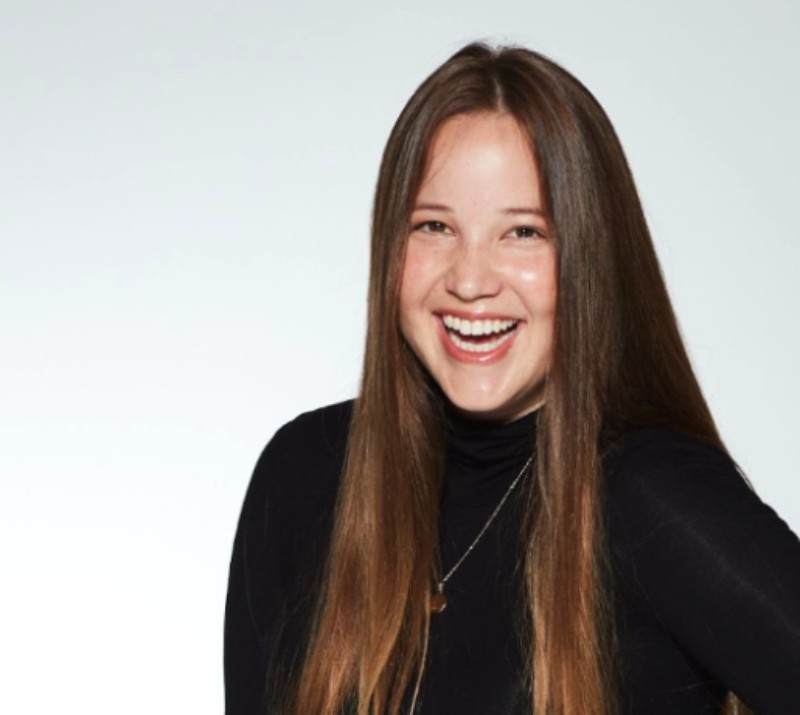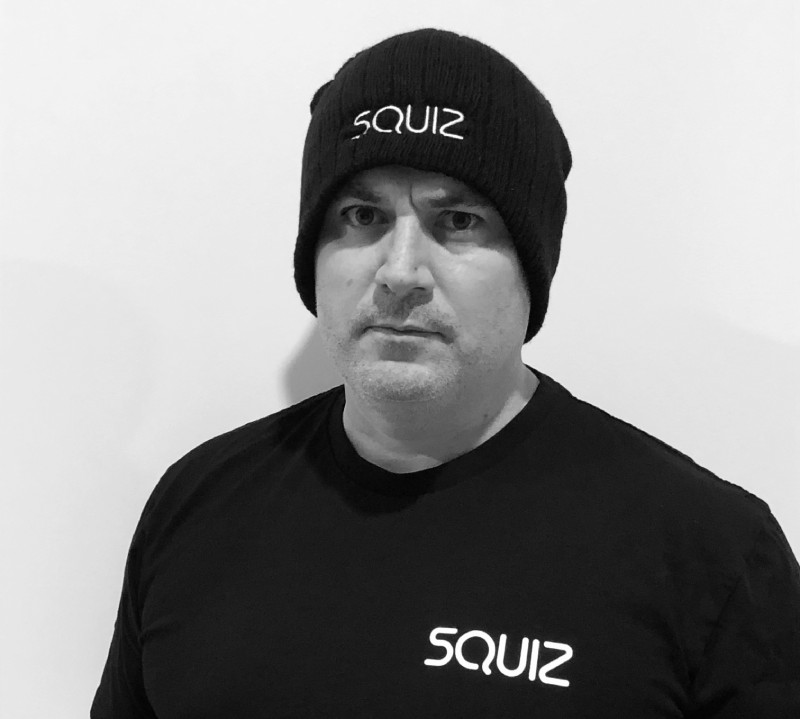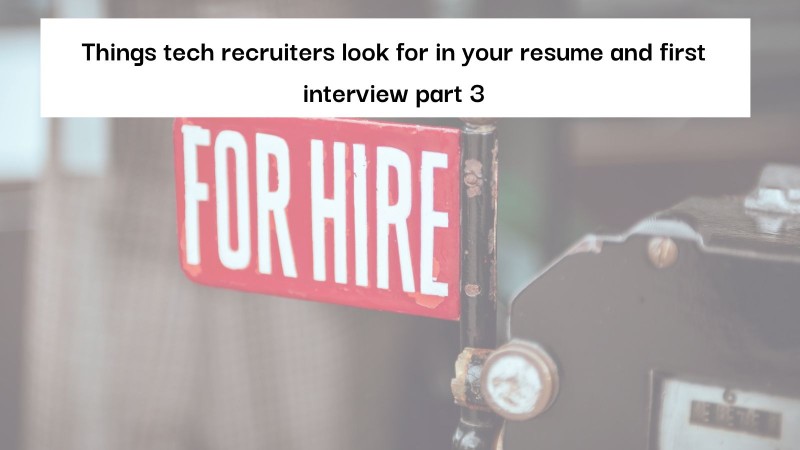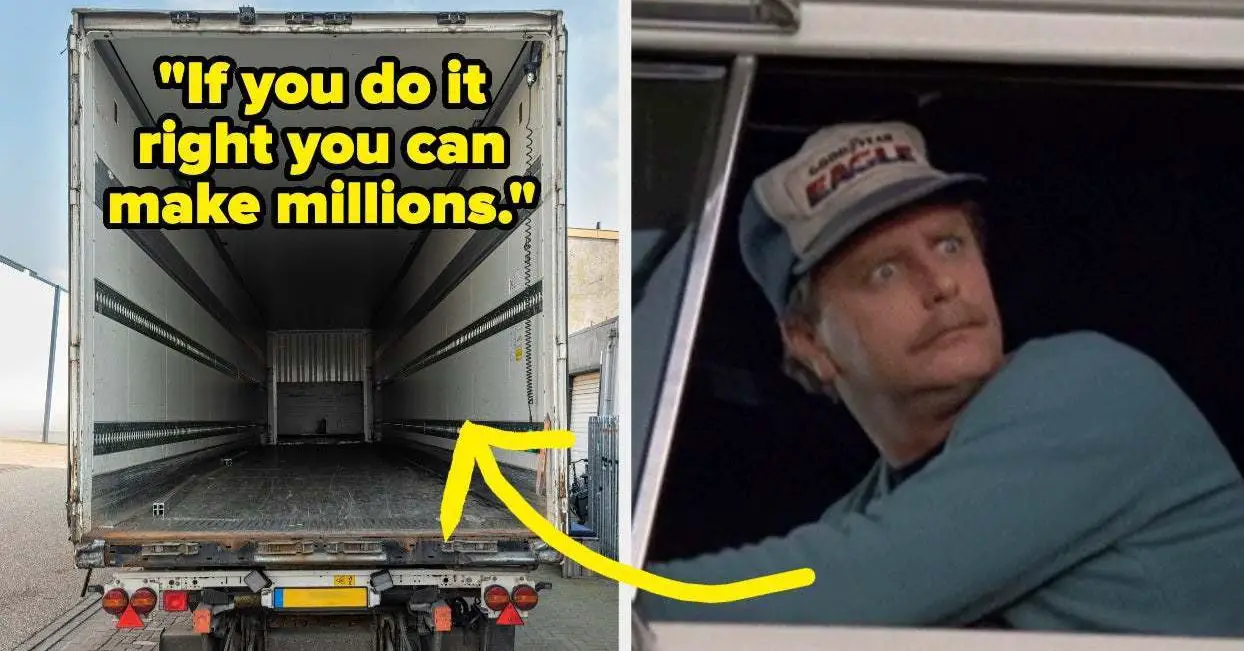Have you applied to 10s of tech jobs and never heard back from anyone? Are you sure that your resume does its main job of getting that first call from the recruiter? Do you want to know what tech recruiters look for in the initial call? If any of your answers were yes, you must read this post.
In this piece, you will hear from three amazing tech recruiters from Sydney’s popular companies reveal the secrets behind a great resume and acing that initial call with the recruiter. Stay tuned!
Table of contents #
The questions #
For this part, the questions that were sent to the three recruiters were as follows:
- How many resumes/candidate profiles do you go through in a day usually?
- What are the things you look for in a resume sent for a technical role?
- What are the top 3 things you evaluate in a candidate when conducting the first interview?
- What would be your most important tip to job seekers while we are going through this difficult macroeconomic situation in 2022?
The Answers #
This time the three tech recruiters are from Atlassian, Harrison, and Squiz. Surely some of the well known brands in the Aussie tech landscape.
Eli (Atlassian) looks for projects led and delivered #

Eli Gündüz has been working as a tech recruiter for almost 10 years now. He has been working for Atlassian for the past 7 months. Atlassian is the only publicly listed tech unicorn from Sydney and if you don’t know Atlassian you surely love to hate Jira :).
Eli has helped over 400 people find tech jobs that are not just better paying but also well-balanced and fulfilling as per his LinkedIn profile. Fun fact from his Linkedin page, he did kickboxing for 9 years.
At the time of writing Atlassian has more than 90 openings in Sydney/Australia and 40+ of them are Engineering, IT, PM and SRE roles.
Eli voiced his opinions about the above question in the following way:
How many resumes/candidate profiles do you go through in a day usually? #
It depends on the role’s seniority, title, and location. I’m currently recruiting for software-orientated roles only and the number ranges between 10 – 15 profiles per day.
What are the things you look for in a resume sent for a technical role? #
I look for education, longevity, key projects led or delivered, and growth in their career as a focus point. I also look into if the candidate has worked for a similar company like ours (Atlassian).
Candidates who have worked in cross-functional teams are a plus for us. They don’t need to have all of these things but scoring on most of them would warrant an interview.
Grammar/spelling mistakes and a sloppy resume structure are also a BIG no to move further.
What are the top 3 things you evaluate in a candidate when conducting the first interview? #
In the first interview I look for:
-
What is their main reason after looking for a new role? This is very important to me because I’d like to know if we can offer them what they are missing right now.
-
How they communicate and explain their experience as well as projects. I look for concise and detailed answers depending on the question and context.
-
Their tech stack and the key projects they were involved in and what their impact was on the team or clients.
And a bonus one:
- What they are looking for in an ideal world. I want to do my best to match what they are looking for and what we can offer them.
What would be your most important tip to job seekers while we are going through this difficult macroeconomic situation in 2022? #
My main tip would be to never stop applying. Continue to upskill yourself. You can also engage with me via Careersycoaching.com if you want extra support on your career. I can help you with writing a resume that will stand out and improve your interviewing muscle, so when the time comes you can put your best foot forward.
Learn what the high-in-demand skills are and most importantly, network using LinkedIn.
Connect with your peers and potential hiring managers. Invest time in your LinkedIn profile. If you have a job, don’t quit. You never know when there is a role available.
The thoughts above are mine and don’t represent the policies or opinions of Atlassian. If you like to read more about our engineering interview process please visit our candidate resource hub.
Those were some excellent advice and tips from Eli, next, we have Pam from Harrison.
Pam (Harrison.ai) focuses on the previous workplaces and tech stacks used #

Pam Stevenson has 10 years of recruiting experience working across agencies and in-house Talent teams for the likes of Google and Commonwealth Bank. After joining scale-up world 2.5 years ago as Head of Talent at Harrison.ai, Pam is loving the fast-paced change and opportunity to do impactful work in AI Healthcare. She cares deeply about people and mentions her love of connecting talent with meaningful career opportunities in her LinkedIn profile.
From my personal experience, I can say she is one of the best tech recruiters out there. She explains the things she looks for in candidates in this video as well.
At the time of writing, Harrison (and its joint ventures, Annalise.ai and Franklin.ai) has over 30 roles open and many of them are tech roles.
Harrison.ai and its ventures operate in the pioneering MedTech sector, creating AI software for various healthcare domains including radiology and pathology that will help save millions of patient lives through early detection and more accurate diagnoses.
She has expressed her views about the above questions as follows:
How many resumes/candidate profiles do you go through in a day usually? #
Typically, my team and I would look at anywhere between 10 – 30 profiles daily. Twice a week, we also have “stalking jam” sessions where we trawl the internet for amazing tech profiles, and on these days, we could look at 40-70 profiles each!
What are the things you look for in a resume sent for a technical role? #
Within seconds of looking at a CV for a technical role, the first impression we notice is actually to do with presentation and layout. A clean, neat structure with white space that allows us to see key information at a glance is ideal. If you present your CV in an organised, clean manner without typos, it certainly bodes well for our initial impression of your organisation and communication skills, as well as your attention to detail.
A split second after first impressions, the next thing we notice is of course someone’s tech stack and how does it match with ours? The consequent thing is places they’ve worked. How long they’ve worked at each place and what projects they worked on are also important.
It’s a good idea for candidates to list 2-3 bullet points for “key achievements” at each place they’ve worked, using data wherever possible to quantify results is really insightful.
It is absolutely fine to see short stints and career gaps here and there on your CV – we get it, life happens. Not every company will be a perfect fit for you. That said, I’d highly recommend you briefly explain the reason behind instances like these in your CV. For example, some of your short stints could be contract gigs, or you wanted to take a career break, and so on.
Too much consecutive job hopping on your CV won’t be perceived well by any potential employer.
The assumption will be that it is a performance or perhaps behaviour-related issue. It is a red flag to see a large number of short stints of less than 12 months over a consecutive number of roles.
When looking at a CV for a technical role, we’re also very mindful that we can teach certain skills but we can’t teach someone to smile or be motivated to love what they do.
We also hope to get a glimpse of someone’s personality from their CV. We love it when candidates write a little detail about their hobbies and interests. Those can be both outside of work and/or work-related. This also becomes a great talking point when we call or even during the interview itself. It helps build natural rapport and allows us to get an initial impression of the cultural addition they can bring to the team and company.
We also love seeing candidates who have gone a little above and beyond to keep ahead of the latest industry trends. Whether from self-study in online courses, writing blogs, working on a side passion project, and so on.
These are all great things to list on your CV.
And finally, we like to see an upwards career trajectory in CVs, evidenced by promotions, awards, etc. Any experience working at a start-up/scaleup or an entrepreneurial flare is awesome. Of course, we pay attention to what role a candidate says they are looking for next. We do not assume that someone will necessarily want to do what they’ve always done. In fact, most people don’t, that is why we love to see a little detail around this in a “career profile” summary at the beginning of a CV.
What are the top 3 things you evaluate in a candidate when conducting the first interview? #
- Cultural and team add: This is number 1 for us! We know we can teach skills, but we cannot teach things like personality and motivation.
We highly value our collaborative and supportive team culture, and so this aspect naturally becomes the first thing we try to get a good sense of as early as possible.
- Motivation: this is super important to understand. We like to know why a candidate is open to leaving their current role. What are they ideally looking for next role? Why this role and why our company, in particular? From these questions, we’ll be able to see how well aligned this role is to the candidate and how well we can support their career aspirations. As well as understand how much research a candidate has done about us and how much they’re truly passionate about what we’re up to.
Because any role in a scale-up requires a certain amount of tenacity and resilience.
These parts come with all the other amazing aspects of being able to have greater impact, wider scope, and role autonomy. First and foremost, we do look for people who are well motivated. They will be more likely to adapt to the peaks and troughs of what it’s like working in a fast-paced and dynamic environment.
- Role-related knowledge: We’ll be checking to make sure there is sufficient role-related knowledge and technical skills at the first interview stage. Of course, it’s hard to proceed without covering this first.
We have to make sure someone has the right amount of knowledge to succeed in the role.
Adequate role-related knowledge is indispensable.
What would be your most important tip to job seekers while we are going through this difficult macroeconomic situation in 2022? #
Keep calm, leverage your networks and continue to invest in your learning. Trust in yourself that you will land an awesome opportunity next or discover an alternate path that aligns better with you.
I really believe that when one door closes, another opens
Which is often even better than the previous one!
Those were some very detailed and useful answers by Pam. They were really helpful and insightful. It was easy to see what goes in the mind of the recruiters and how as a candidate you can make their job simpler. Next, we have Adam from Squiz answer the same set of questions.
Adam (Squiz) seeks passion and confidence #

Adam Cicchetti is a talent acquisition business partner at Squiz for the past 2 months. Squiz is a 20+ years old multinational company that provides both SaaS products and services to build enterprise-grade websites, portals, intranets, and digital apps. Adam has been involved in talent acquisition and recruitment since 2004 as per his Linkedin profile.
Adam is good at creating a buzz by selling the organisation and role. With the wealth of experience of being in the field for more than 17 years, he surely knows the nooks and corners of recruitment.
At the time of writing Squiz had more than 20 open roles in Australia on their careers page.
Being multinational, Squiz also had open roles in other countries like the UK and New Zealand.
Below is Adam’s point of view on the topics of this blog post:
How many resumes/candidate profiles do you go through in a day usually? #
This really varies on the level/seniority of the roles I am working on at the time. If the tech is in high demand it will dictate the volume of applicants. It can be anything from 50-150 resumes per day. Then there are profiles on LinkedIn. It’s generally a mix of both resumes and LinkedIn profiles.
What are the things you look for in a resume sent for a technical role? #
This is where you’ll find recruiters differ. Keep in mind with so many resumes to review these initial steps are very quick. More of a scan than a full read. Once my interest is spiked and there is enough there I will take the time to go back through and read in detail.
Candidates should put enough that it spikes interest and not too much that I have to book my afternoon out to read it.
Essentially, make it clear and easy to read. It is best to put things in bullet point form. Within reason I will still try and read between the lines and do a little deciphering.
My process in rough order is something like the below:
I do a quick scan for the technology, i.e. React or Node. I want to be clear about the technology you were working on or are responsible for.
Then I look at the tenure coupled with any visible career progression. For instance, moving from intern to software engineer or to senior software engineer etc is a good thing.
Coupled with this, scanning the tenure of the various roles, did you jump roles a lot? The last few years have made this area more flexible due to Covid and the changing economic climate.
For the role itself that you were in, does the resume explain in a quick summary what you actually did? When describing the role and the tasks responsible for, is it clear. I would further look for the purpose of the role, and the type of company – such as product vs services.
Make the resume easy for the reviewer to understand. I don’t have time to go off and Google things or even look at other team members’ profiles.
At the same time, I’m looking at how it’s worded with a focus on spelling and grammar. I ask myself does it make sense? Finally, to a lesser degree, I have a look at the visa/work rights and salary details if I’ve asked for them.
What are the top 3 things you evaluate in a candidate when conducting the first interview? #
- Cultural fit/communication skills – The way you explain your work history is important. I am looking for pointers like the level of passion you demonstrate and confidence in your answers.
Not everyone is loud and outspoken. But you still pick up how they will work with your team and company based on the conversation. This is key.
The rest would want to be exceptionally good if this is off. There is so much about not hiring for culture fit if you want diversity. This isn’t about hiring the same type of person over and over again, this about whether I can see you working with the team and broader company in ‘your way’. Bring yourself as you are but still be a fit to a certain degree. Different opinions, different styles and ways of working are welcomed. The main analysis here is will the way you work and communicate work with our team/company?
-
The tech – I will notice the way the candidate tells me about what they did. How do they define their role in the team and what was the purpose of their role and the team. How does that align with us, and is it transferable or aligned to what we do? It’s not about 100% fit.
-
Being clear on what you are looking for next – Knowing what you want to do next and why you want to do that is crucial. What does it look like, the tech, responsibilities, type of company, etc is very important for the candidate to be happy if hired. It is again about the passion and motivation for the craft and the role. This can also give insight into if we can offer that career path and possible longevity.
To be transparent on this, don’t apply for a software engineer role and then tell me when I ask, that my ideal next role is a PM.
If it is a means to get where you want then it is fine, but be crystal clear about it.
What would be your most important tip to job seekers while we are going through this difficult macroeconomic situation in 2022? #
Some of the questions you should be asking yourself in this scenario are:
- Do I believe in the product/service?
- Is there going to be a product, or is it a dream?
- If there is a product/service, would I buy it? Can I see value in it?
- Is there already a market? Who are their clients? Do they have clients?
It’s easy to get caught up in watching all this content, office parties, holidays and above market salaries.
They do a great job at selling themselves, no doubt this will change and have to readjust.
Look at the housing market, it’s not sustainable. Again do your research, if it sounds too good to be true, well think about it. Also consider how long will the company last if it is burning a lot of cash.
Those were some helpful answers by Adam. If you are applying for your next role, make sure your resume and communication are crystal clear not muddy.
Conclusion #
There you have it, you have read all the juicy detail of how tech recruiters look at resumes and seek for in the first interview.
I would like to heartily thank all of the three recruiters for being generous with their time and answering all the questions so well.
I should indicate that being ghosted by some recruiters while trying to compile this was not fun. Still, I understand that the economic climate is not congenial, many companies are in hiring freeze mode and some had to execute unfortunate layoffs too.
If you have read this far, you would also be intrested in Part 1 from 2019 and Part 2 from 2020 of this converations where I interviewed internal tech recruiters from Safety Culture, Site Minder, Domain and Canva.
With all the useful insider information about the ins and outs of tech recruitment, I hope you can make your job search journey a bit easier. Get ahead on the applying and Application Tracking System (ATS) filters and queues. Best of luck!
Source link











Leave a Reply